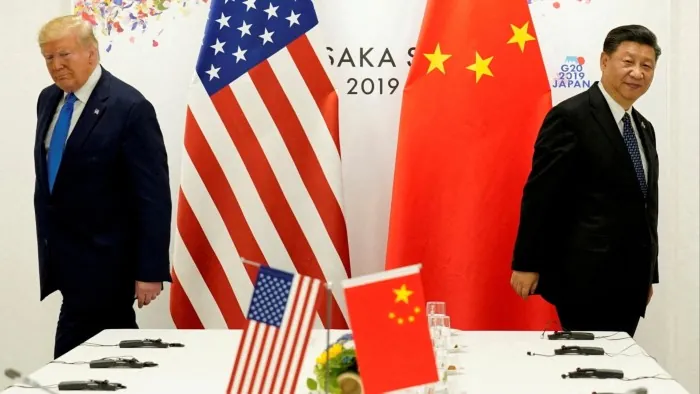
US-China Trade Turmoil: Is Economic Divorce Imminent?
2025-04-10
Author: Wei
As tensions escalate between the world's two largest economies, Chinese exporters are being forced to navigate a new trade landscape marked by significant US tariffs. In a bid to mitigate the impact, many have resorted to raising prices, canceling shipments, and rerouting goods to alternative markets.
Amid this chaos, the US president announced a 90-day pause on additional tariffs for most nations but maintained a staggering 104% tariff on Chinese goods, adding an extra 21% aimed specifically at punishing China for its retaliatory measures.
This pressure is pushing many Chinese sellers on ecommerce platforms like Amazon, Shein, and Temu to increase prices by as much as 70% for American consumers. Some sellers are even reevaluating their presence in the US market, stating that ongoing tariffs have made trade nearly impossible.
"The burden from the US tariffs is something we cannot bear," said Wang Xin, president of a major ecommerce association representing over 2,000 Chinese sellers. He noted that trading under current conditions feels like walking through fire.
In a desperate bid to adapt, some manufacturers are building factories in third countries such as Jordan to produce goods for export back to the US. Others are exploring ways to reroute goods through nations that have favorable trade agreements with the US.
Despite these strategies, uncertainty looms large. Many in the industry have adopted a wait-and-see approach. "Planning for the future is almost impossible right now," said Hu Jianlong, CEO of Brands Factory, illustrating the prevalent anxiety among merchants.
Shipping companies are feeling the pinch too, with cancellations of transpacific orders becoming increasingly common. One industry insider from Shanghai expressed concern over the wave of cancellations, stating, "There's so much uncertainty that many are pulling their orders." Many shipments to US ports are now on hold due to this chaotic environment.
Conversely, the US is also feeling the sting of Beijing's retaliatory tariffs. Reports indicate that shipments of US gas to China have been canceled due to overwhelming tariffs, further complicating the trade narrative.
In a move that underscores China's resilience, Beijing implemented an additional 84% in retaliatory tariffs, bringing the total on American imports to over 100%. China's commerce ministry declared that the country would not back down from the trade war, emphasizing equal dialogue but readiness for confrontation, stating, "If you want to fight, China will fight to the end. Pressure and threats are not the way to deal with us."
The Chinese yuan has also taken a hit, hitting its lowest level since 2007 as Beijing allows progressive depreciation in response to US tariffs. On Thursday, the yuan weakened to Rmb7.351 per dollar before rebounding slightly.
In tandem with these economic shifts, US Treasury Secretary Scott Bessent issued a warning against China devaluing its currency. Meanwhile, China is reaching out diplomatically, engaging with trade representatives from Europe and Southeast Asia.
While US equities saw a dip following the president's tariff announcements, international markets experienced a different narrative with many indices rising sharply. The S&P 500 fell 2.1%, breaking from its recent surge, while Asian markets enjoyed notable gains.
Despite the thunderous sound of trade battles, China's stock indices managed to close higher, hinting at government support behind the scenes. Overall, the world watches closely as this trade standoff intensifies—could an economic divorce truly be on the horizon?


 Brasil (PT)
Brasil (PT)
 Canada (EN)
Canada (EN)
 Chile (ES)
Chile (ES)
 Česko (CS)
Česko (CS)
 대한민국 (KO)
대한민국 (KO)
 España (ES)
España (ES)
 France (FR)
France (FR)
 Hong Kong (EN)
Hong Kong (EN)
 Italia (IT)
Italia (IT)
 日本 (JA)
日本 (JA)
 Magyarország (HU)
Magyarország (HU)
 Norge (NO)
Norge (NO)
 Polska (PL)
Polska (PL)
 Schweiz (DE)
Schweiz (DE)
 Singapore (EN)
Singapore (EN)
 Sverige (SV)
Sverige (SV)
 Suomi (FI)
Suomi (FI)
 Türkiye (TR)
Türkiye (TR)
 الإمارات العربية المتحدة (AR)
الإمارات العربية المتحدة (AR)